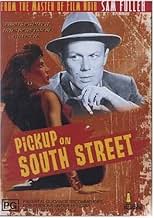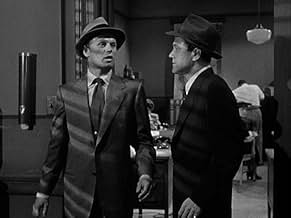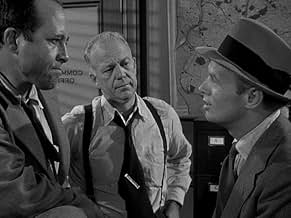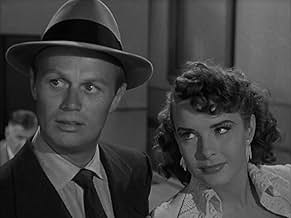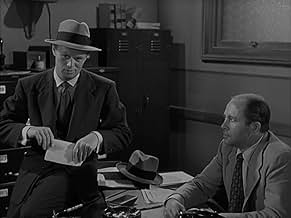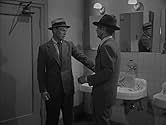A pickpocket unwittingly lifts a message destined for enemy agents and becomes a target for a Communist spy ring.A pickpocket unwittingly lifts a message destined for enemy agents and becomes a target for a Communist spy ring.A pickpocket unwittingly lifts a message destined for enemy agents and becomes a target for a Communist spy ring.
- Nominated for 1 Oscar
- 2 wins & 4 nominations total
- Zara
- (as Willis B. Bouchey)
- Headquarters Communist in Chair
- (uncredited)
- Undetermined Secondary Role
- (uncredited)
- Fight Spectator
- (uncredited)
- Nurse
- (uncredited)
- Detective Dietrich
- (uncredited)
- Subway Passenger
- (uncredited)
- Detective Eddie
- (uncredited)
- Fenton
- (uncredited)
- Detective Lt. Campion
- (uncredited)
- Library Worker
- (uncredited)
- Lum
- (uncredited)
- Director
- Writers
- All cast & crew
- Production, box office & more at IMDbPro
Featured reviews
A prostitute has her purse snatched on the subway. It contains a microfilm, and a communist spy ring will go to any lengths to recover it. Two parallel investigations unfold as both spies and cops hunt down the precious information.
Anti-hero pickpocket Skip McCoy is played with scornful assurance by Richard Widmark. He knows the cops to be his moral equals and intellectual inferiors, so he taunts them: "Go on," he says to captain Dan Tiger (Murvyn Vye), "drum up a charge. Throw me in. You've done it before." In this pitiless world, the cops are just one more gang on the streets. Just as Candy the hooker bribes Lightning Louie to get a lead, so the police are busy paying stool pigeons for information.
It is hard to believe that when Widmark made this film he was already in early middle age. The 39-year-old star, coming to the end of his contract with Fox, plays the upstart Skip McCoy with the irreverent brashness of a teenager. Today it may not be acceptable for the romantic lead to punch his love interest into unconsciousness then revive her by sloshing beer in her face, but by the mores of the period it signified toughness - and Candy, after all, is a fallen woman.
Jean Peters is radiant as Candy. Here, right in the middle of her five-year burst of B-movie fame, she is beautiful and engaging as the whore with the golden heart. She is the story's victim, a martyr to her beauty as much as anything else. She means well, but is constantly being manipulated by cynical men - Joey, Skip and the cops.
The real star of this movie is New York. Haunting urban panoramas and snidering subway stations offer a claustrophobic evocation of the city as a living, malevolent force. Like maggots in a rotting cheese, human figures scurry through the city's byways. Elevators, subway turnstiles, sidewalks - even a dumb waiter act as conduits for the flow of corrupt humanity. People cling to any niche that affords safety: Moe has her grimy rented room, Skip his tenebrous shack on the Hudson River. As the characters move and interact, they are framed by bridge architecture, or lattices of girders, or are divided by hanging winch tackle. The personality of the city is constantly imposing itself. The angles and crossbeams of the wharf timbers are an echo of the gridiron street plan, and the card-index cabinets in the squadroom mimic the Manhattan skyline. When Joey's exit from the subway is barred, it is as if the steel sinews of the city are ensnaring him.
A surprising proportion of this film is shot in extreme close-up. Character drives the plot, as it should, and the close-ups are used to augment character. When Skip interrogates Candy, the close-up captures the sexual energy between them, belying the hostility of Skip's words. Jean Peters' beauty is painted in light, in exquisite soft focus close-ups. The device is also employed to heighten the tension. The opening sequence, the purse snatch, contains no dialogue: the drama relies entirely on close-up for its powerful effect.
Snoopers, and snoopers upon snoopers, populate the film. Moe (Thelma Ritter) makes a living as an informant, and her place in the hierarchy is accepted, even by her victims. When Skip observes, "she's gotta eat", he is chanting a recurring refrain. Just as 'straight' New Yorkers peddle lamb chops or lumber, the Underworld traffics in the commodity of information.
And yet even the stool pigeons are superior to Joey and his communist friends. Joey's feet on Moe's bed symbolise a transgression of the most basic moral code. Joey is beyond the pale. Moe will not trade with Joey, even to preserve her life: " ... even in our crummy business, you gotta draw the line somewhere."
"Pick-Up" was made in the depths of the Cold War. Richard Nixon had just been chosen as the Republican vice-presidential candidate, having made his name with his phoney Alger Hiss expose - bogus communist microfilm and all. The McCarthy show trials were a daily reality. We see the cops in the movie inveigh against "the traitors who gave Stalin the A-bomb".
New York can be seen as a giant receptacle in which human offal cheats, squeals and murders. Containers form a leitmotif throughout the film. Moe carries her trade mark box of ties, and candy's purse, container of the microfilm, is the engine of the plot. Skip keeps his only possessions in a submerged crate, symbolising his secretive street-wisdom. The paupers' coffins, moving down the Hudson on a barge, are containers of just one more cargo being shifted around the pitiless metropolis.
The film is a masterpiece of composition. Candy is shown above the skulking Skip on the rickety gangway of the shack, signifying her moral ascendancy. When the gun is placed on the table, the extreme perspective makes it look bigger than Candy - violence is beginning to dwarf compassion. The lovers are eclipsed by the shadow of a stevedore's hook, reminding us that their love is neither pure nor absolute, but contingent upon the whims of the sinister city. Enyard the communist is a shadow on a wall, or a disembodied puff of cigarette smoke. He is like the lone alley cat amongst the garbage - a predatory phantom of the night. Camera shots from under taxi hoods, inside newspaper kiosks and through the bars of hospital beds constantly reinforce in us the awareness that we are all trapped in the metropolis. We are civilisation's mulch.
Director Samuel Fuller has crafted an exceptional drama set amongst the seedy underworld of New York City. Communist spies and shady government operatives all blend together to make Pickup On South Street a riveting viewing from first minute to the last. Based around a Dwight Taylor story called "Blaze Of Glory", Fuller infused this adaptation with a heavy set political agenda, something that many at the time felt was over done, but to only focus on the anti communist leanings is doing it a big disservice.
Digging a little deeper and you find characters as intriguing as any that Fuller has directed. The main protagonist for one is the hero of the piece, a crook and a shallow human being, his heroics are not born out of love for his country, they are born out of his sheer stubborn streak. It's quite an achievement that Fuller has crafted one of the best anti heroes of the 1950s, and I'm sure he was most grateful to the performance of Richard Widmark as McCoy. Widmark is all grin and icy cold heart, his interplay with the wonderful Jean Peters as Candy is excellent and is the film's heart. However, it is the Oscar nominated Thelma Ritter who takes the acting honours, her Moe is strong and as seedy as the surrounding characters, but there is a tired warmth to her that Ritter conveys majestically.
It's a "B" movie in texture but an "A" film in execution, Pickup On South Street is a real classy and entertaining film that is one of the best from its most intriguing director. 9/10
Richard Widmark is way on top of his game as a smart-alec -- he's really great -- but the highlight performance of the film was the first scene for "Moe," the street peddler/informer, played by Thelma Ritter. Later, in her apartment, you are not seeing a movie -- you're seeing a real person. I've never seen anyone "act" so real I felt like I was looking into a real room until Ritter's performance -- right down to the way her hair stuck out a bit when she removed her hat.
About a million other things just *worked,* from the way Lightning Louie picks up money with his chopsticks to the way Candy's jewelry clicks when she flicks Moe's hand away from her brooch, to the way Moe gets the dollars and change from the police captain across the FBI guy's chest -- and even the way the captain opens his filing cabinet, like he's been doing it in that way in that room for many years. "Pickup On South Street" is detailed moves (directing) with consummate performances (acting) and superb now-nostalgic visuals of the day, such as the panel truck, the boards leading to the shack out on the water, the dumbwaiter, -- and the unforgettable place Skip stashes his pocket pickings. Wonderful stuff.
"Pickup On South Street" is also one of the few movies where, even though the characters aren't perfect, you do care about them -- perhaps because they have been somewhat branded by their pasts in ways that are hard to escape: Skip as a "three-time loser" and Candy as a youngish woman who has "knocked around" a lot. When these people behave a little more badly than you'd expect, it's in sort of novel ways that make it seem you're looking in at people you'd never otherwise imagine -- and yet you know that they are possible because the actors make them so recognizably human.
Storyline
Did you know
- TriviaThe last of four films in four successive years that Thelma Ritter was nominated for the Best Supporting Actress Oscar. This film follows nominations for All About Eve (1950), The Mating Season (1951) and With a Song in My Heart (1952).
- GoofsWhen Joey leaves the basement after assaulting the police officer, he walks out of the shot, then a cat is obviously thrown into the frame.
- Quotes
Moe Williams: Listen, Mister. When I come in here tonight, you seen an old clock runnin' down. I'm tired. I'm through. Happens to everybody sometime. It'll happen to you too, someday. With me it's a little bit of everything. Backaches and headaches. I can't sleep nights. It's so hard to get up in the morning, and get dressed and walk the streets. Climb the stairs. I go right on doin' it! Well, what am I gonna do, knock it? I have to go on makin' a livin'... so I can die. But even a fancy funeral ain't worth waitin' fer if I gotta do bus'ness with crumbs like you.
- Alternate versionsWhen the movie was released in France, the French dubbing replaced the communists spying with drug dealing to avoid political controversy. No English print with subtitles went in circulation. The French title "Le port de la drogue" could be translated by "Pier of Drug". The original version was released several years after.
- ConnectionsEdited into American Cinema: Film Noir (1995)
- How long is Pickup on South Street?Powered by Alexa
Details
- Release date
- Country of origin
- Language
- Also known as
- Blaze of Glory
- Filming locations
- West 6th Street and Grand Avenue, Los Angeles, California, USA(Candy on the street after getting off the subway at the beginning of the film)
- Production company
- See more company credits at IMDbPro
Box office
- Budget
- $780,000 (estimated)
- Runtime1 hour 20 minutes
- Color
- Aspect ratio
- 1.37 : 1
Contribute to this page



